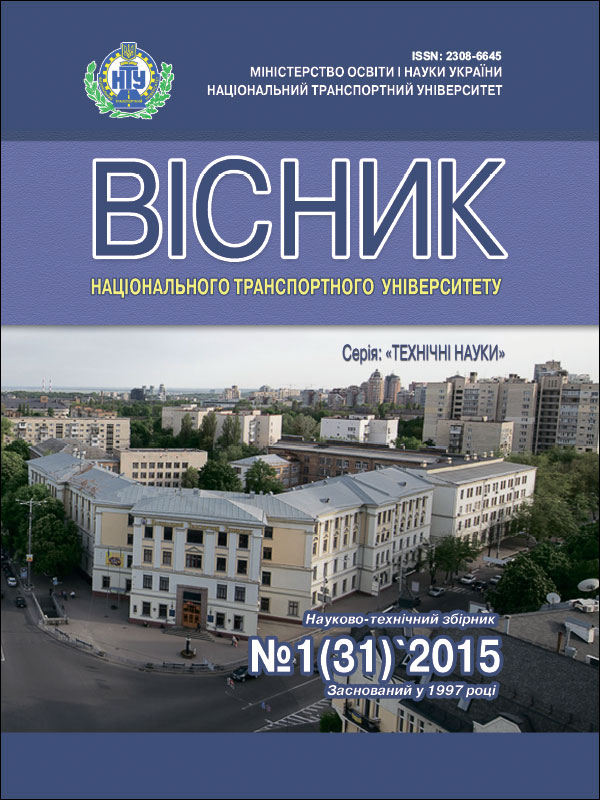MANAGING REVERSE FLOWS IN THE CLOSED-LOOP SUPPLY CHAIN
ABSTRACT
Halak I.I., Kriukovska L.I., Managing reverse flows in the closed-loop supply chain. Visnyk National Transport University. Series «Technical sciences». Scientific and Technical Collection. - Kyiv: National Transport University, 2021. - Issue 1 (48).
The article proposes the use of the sustainable development, reverse and green logistics tools for effective development of a responsible supply chain management system.
The object of research is the reverse and green logistics.
The purpose of the study is to analyze the theoretical basis of the reverse and green logistics interaction in order to substantiate the optimal structure of the supply chain, taking into account its impact on the components of sustainable development.
Methods of the study are the analytical approach and mathematical methods.
The traditional supply chain aims to lower the cost and improve the efficiency of supply chain enterprise so as to maximize the economic benefits. Closed-loop supply chain also seek to maximize economic benefits, to decrease the consumption of resources and energy and to reduce the emissions of pollutants - all in an effort to create a socially responsible enterprise, and to balance the economic benefits, social effects and environmental effects.
To improve the management of reverse flows, the authors of this article propose to integrate the principles of sustainable development in the activities of companies that are part of the supply chain, it will protect the company's reputation and brand value and increase the efficiency of the supply chain. Also, it will help minimize the costs of environmental, social and economic impact. For continuous monitoring the situation related to the imbalance of the links in a closed-loop supply chain are offered an algorithm of using the bottleneck method.
The results of the study can be recommended for implementation in organizations that are directly involved in bringing the material flow from supply to consumption.
KEYWORDS: REVERSE LOGISTICS, GREEN LOGISTICS, CLOSED-LOOP SUPPLY CHAIN, SUSTAINABLE DEVELOPMENT.
REFERENCES
- Halak I.I., Babyna D.A. Perspektyvy vykorystannia reversyvnoi lohistyky v ahropromyslovomu kompleksi: ekolohichnyi aspekt. Visnyk Natsionalnoho transportnoho universytetu. Ser. Ekonomichni nauky. Vyp. 2(47). S. 59-69Judge, W.Q. and Douglas, T.J. (1998), «Performance implications of incorporating natural environmental issues into the strategic planning process: an empirical assessment», Journal of Management Studies, Vol. 35 No. 2, pp. 241-262.
- Maxwell, D. and Van der Vorst, R. (2003), «Developing sustainable products and services», Journal of Cleaner Production, Vol. 11 8, pp. 883-895.
- Seuring, S. and Muller, M. (2008), «From a literature review to a conceptual framework for sustainable supply chain management», Journal of Cleaner Production, Vol. 16 No. 15, pp. 1699-1710.
- Wood, D.J. (1991), «Corporate social performance revisited», Academy of Management Review, Vol. 16 No. 4, pp. 691-718.
- Gold, S., Seuring, S. and Beske, P. (2010), «The constructs of sustainable supply chain management - a content analysis based on published case studies», Progress in Industrial Ecology: An International Journal, Vol. 7 No. 2, pp. 114-137.
- Diabat, A., Khodaverdi, R. and Olfat, L. (2013), «An exploration of green supply chain practices and performances in an automotive industry», International Journal of Advanced Manufacturing Technology, Vol. 68 Nos 1-4, pp. 949-961.
- Dixon, R., Mousa, G.A. and Woodhead, A. (2005), «The role of environmental initiatives in encouraging companies to engage in environmental reporting», European Management Journal, Vol. 23 No. 6, pp. 702-716.
- Carter, C.R. & Ellram, L.M. (1998). Reverse Logistics: A review of the literature and framework for future investigation, Journal of Business Logistics, Vol. 19, no. 1, pp. 85-102.
- Dowlatshahi, S. (2000). Developing a theory of Reverse Logistics. Interfaces, Vol. 30, No 3, May- June, pp. 143-155.
- Rogers, D.S. & Tibben-Lembke, R.S. (1999). Going backwards: Reverse Logistics trends and practices. Reverse Logistics Executive Council, Pittsburgh, P.A.
- Stock, J. (1998). Development and implementation of reverse logistics programs. Oak Brook: Council of Logistics Management.
- Kates, R.W., Parris, T.M., Leiserowitz, A.A. (2005). What is Sustainable Development? Goals, Indicators, Values, and Practice. Environment: Science and Policy for Sustainable Development, 47(3): 821.
- Krikke, H. R., Le Blanc, H. M., & Van de Velde, S. Creating Value from Returns? The Impact of Product Life Cycle Management on Circular Supply Chains and Reverse. / Krikke, H. R., Le Blanc, H. M., & Van de Velde, S // CentER-AR Working Paper. - Tilburg: Department of Economics, 2003. - Vol. 20032.
- Raj Kumar, R.M. Satheesh Kumar. Closed Loop Supply Chain Management and Reverse Logistics -A Literature Review, International Journal of Engineering Research and Technology. ISSN 09743154 Volume 6, Number 4 (2013), pp. 455-468
- United Nations Global Compact: Supply Chain Sustainability Resources and Practices https://ppv.net.ua/uploads/work_attachments/Responsible_Supply_Chain__UA_.pdf
- Iashyn O.O., Riashko M.L. Lohistyka. Osnovy planuvannia y otsinky efektyvnosti lohistychnykh system. Yekaterynburh: Vyd-vo Uralskoho universytetu, 2014. - 52s.
AUTHOR
Halak Iryna, Ph.D., associate professor, National Transport University, associate professor of Department of transport Law and Logistics, e-mail: 1017imiia@gmail.com, tel. +380978459880, Ukraine, 01010, Kyiv, M. Omelianovycha-Pavlenka Str.1, of. 439, orcid.org/0000-0002-5038-7771.
Kriukovska Lesia, Ph.D., associate professor, National Transport University, associate Professor of the Department of ecology and life safety, e-mail: krjukovska@gmail, тел. +380979234707, Ukraine, 01010, Kyiv, M. Omelianovycha-Pavlenka Str.1, of. 312, orcid.org/0000-0001-8944-8036.
REVIEWER
I
Khlevna YL, Doctor of Technical Sciences, Associate Professor, Taras Shevchenko National University of Kyiv, Associate Professor of the Department of Technological Management, Kyiv, Ukraine.
Khrutba Viktoriia A., Doctor of Technical Science, National Transport University, professor, Head of the Department of Ecology and Safety of Vital Functions.
Article language: Ukrainian
Open Access: http://publications.ntu.edu.ua/visnyk/48/073-082.pdf
Print date: 15.03.2021
Online publication date: 05.04.2021
